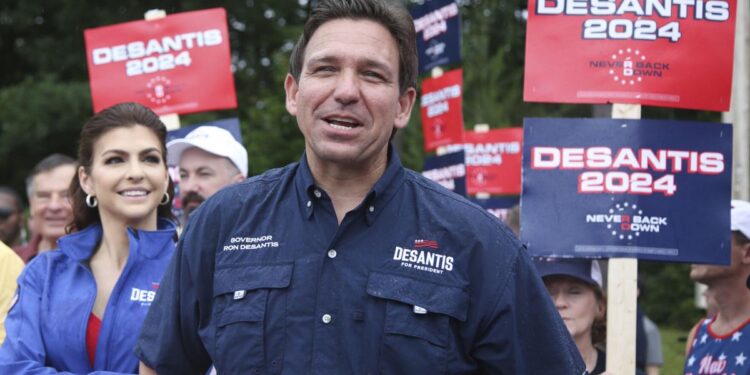This week I would like to talk to you about Ron DeSantis. DeSantis’ is currently running for the presidency of the United States and it is not going great. It isn’t that he has made any awful gaffes or anything. There were discussions online about his likeability and there have been some negative stories about his wife Casey. It has been pretty tame stuff so far. My question this week is why isn’t the highest profile “not Trump” candidate doing better and how can he turn the ship around.
Ron DeSantis is not doing particularly well in the polls. Longtime readers know that polls of primary voters, particularly this early, should be taken with a grain of salt. That being said, the gap between DeSantis and former President Trump is large. The website 538.com which averages polling results estimates an almost 20 percentage point gap between Trump (52.2 percent) and DeSantis (23.3 percent). If I were a DeSantis supporter though that would concern me less than the trend line. In Feb./March of this year the race was within two percentage points. Trump’s lead is growing. We would expect Trump to begin the race with a lead given his high name-recognition. That he is gaining ground over DeSantis has to be troubling to the Florida governor. To make matters worse, DeSantis had not even declared his candidacy in Feb./March. He did not formally declare he was running for the presidency until late May, by which time his polling numbers had already slipped. Politics is like a lot of things. Timing is everything and DeSantis may have let his time slip by declaring so late.
Can Ron DeSantis turn this around? It is going to be extremely challenging. From my perspective, DeSantis has based his campaign on a very narrow argument. He presents much of the same policies and red meat to the Republican base as President Trump but hopes to win people to his side by having less of the baggage that Trump has. The issue is that a lot of Republican primary voters would prefer to vote for Trump in that case. While President Trump is deeply unpopular with Democrats and Independents, he has maintained his popularity with Republicans. This is true even after Jan. 6 and Trump’s recent criminal indictments. Republicans who dislike Trump would probably vote for DeSantis but their current preference is for the other Republicans in the race like Tim Scott, Nikki Haley, or someone else. He is too close to Trump to get their support while being “not Trump” hurts him with Trump’s core supporters.
Gov. DeSantis has plenty of time so the race is far from over, but it is fair to wonder what strategy would turn this around. The most obvious first step is to try and consolidate the anti-Trump Republican vote behind a single candidate. President Biden did this brilliantly in the 2020 Democratic primary. He was able to successfully get the other moderate Democrats to drop out of the race and endorse him while the candidates on the left-flank (Warren and Sanders) could never consolidate. Currently polling says that Trump would still be a favorite in that scenario but it would make an upset much more likely.
The other thing DeSantis could do is to try and make this a campaign about electability. According to a Public Opinion Strategies poll released last week, DeSantis is beating Biden in a hypothetical match-up (46/44) while Trump is losing to Biden (43/47). Republicans are saying that they care more about principles than electability right now (63/35 according to Marist/NPR) but that is an easy thing to say in June. Historically, by the time the primary elections roll around voters rate electability in the general election as their No. 1 factor in selecting a candidate. There are going to be voters whose preference is Trump but see DeSantis as preferable to Biden. If they think that Trump will lose in November, they could switch to DeSantis.
Gov. DeSantis is a distant second for the Republican nomination for president in 2024. He is the most likely Republican to be able to pounce if a Trump backlash ever comes among Republicans. If he can build a coalition among Republican primary voters, he would be a strong challenger to win the presidency in 2024. The issue for him now is that the further back he falls the more he risks some other candidate taking up the flag of anti-Trump Republicans. Is DeSantis willing to risk alienating Trump supporters to do that? Or is he banking all his hopes on Republican primary voters coming around to electability? It is a tricky dance that DeSantis is trying to do and it will be fascinating to watch and see if he pulls it off over the next year.
David Searcy holds a master’s degree from Oklahoma State University and a PhD in political science from Southern Illinois University.
Want to reach a local audience and grow your business?
Our website is the perfect platform to connect with engaged readers in your local area.
Whether you're looking for banner ads, sponsored content, or custom promotions, we can tailor a package to meet your needs.
Contact us today to learn more about advertising opportunities!
CONTACT US NOW




